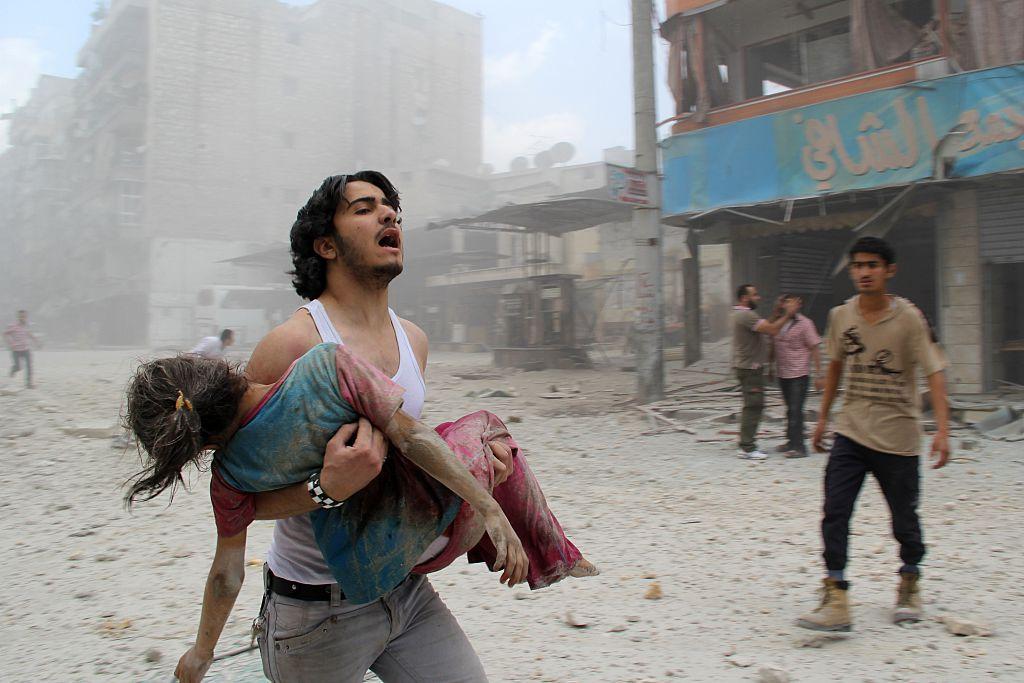Syrian women still gravely suffering nine years on: ‘Husbands refrain from having a sexual life with them. They just leave them’
‘As women, we have been severely affected by the crisis,’ pregnant 16-year-old tells The Independent

“Things are getting much worse than before in our village,” Amira* says. “Women’s circumstances have worsened a lot. Our husbands are constantly nervous and tense. They often curse us and use physical violence against us. They hit us, as well as being very violent during sex.”
The pregnant 16-year-old, whose life has been dominated by war, lives in a village in the al-Qamishli area in northeastern Syria with her two children. Amira says women have been some of the hardest hit by the Syrian conflict.
“As women, we have been severely affected by the crisis,” Amira, who is in her third month of pregnancy, adds. “We have a lot of anxieties and miseries. Men don’t even think about us. They just want us to be pregnant again and again, and we can’t refuse to be pregnant as we are terrified of being divorced.”
Her comments come as Sunday marks the ninth anniversary of the Syria crisis – a catastrophe the Syrian Observatory for Human Rights estimates has killed over half a million people, internationally acknowledged as one of the worst humanitarian crises of our time.
“The crisis has created high levels of tension and instability,” the mother-of-two adds. “We are exceedingly afraid of the uncertain future due to the current situation. We are facing a distressing financial crisis due to the unavailability of employment and the Turkish invasion. We have been displaced from our villages, and are living nowadays in schools and temporary shelters that are by no means appropriate for living. We hardly obtain our daily bread and other basic means of living.”
Inside Idlib: Syrians caught in the crossfire
Show all 24She continues: “I’ve heard from my cousin in the nearby village that she is suffering a lot from obstetric fistula, and her husband always complains about the bad smell. He always threatens her with divorce as he repeatedly feels disgusted by her and doesn’t want to be close to her.”
Her comments echo those of a leading United Nations official who says there is a growing problem of husbands abandoning their wives in Syria if they develop obstetric fistula, a medical condition that causes a hole to develop in the birth canal as a consequence of childbirth, leaving women incontinent and often leading to shame and social ostracisation.
Dr Luay Shabaneh, the regional director for Arab States for the United Nations Population Fund (UNFPA) who goes to Syria frequently, says: “Some women face the issue of obstetric fistula because there are delays in health treatment. Husbands refrain from having a sexual life with them. They just leave them. It is a recurrent problem. The family can be destroyed.
“Gender-based violence increases when humanitarian crises become more difficult. Child marriage is becoming an economic coping strategy for families in order not to have the burden of protecting their daughters. Some women in Syria are married twice by the age of 18. Their husband may have died or they don’t know where he is. She may have a little kid, no income and no support.
“The suffering has a long-term impact – when you get an innocent girl to get married at the age of 12 or 15 then she will suffer for the rest of her life. The silence of bullets does not mean there is a silence in the suffering of women. We have to accompany women and girls until they are back in their homes and re-establish their own lives. On the anniversary of the crisis what we can see is the suffering is still there.”
Dr Shabaneh explained that pregnant women are routinely taking high-risk journeys, not knowing if they will arrive safely or if the trip will result in death.
Some 960,000 people are estimated to have been displaced since December, 80 per cent of whom are women and children and approximately 25,000 are currently pregnant.
His warnings come as the UNFPA says it is gravely alarmed by the situation unravelling in northwestern Syria as we enter the 10th year of the crisis and hostilities carry on triggering mass displacements and damage to civilian services.
The UN organisation, which strives to improve reproductive health across the world, says the most recent displacement further exacerbated an already stark situation in northwest Syria, where 2.8 million people out of 4 million were already estimated to be in desperate requirement of humanitarian help.
Women and girls in Syria are bearing the brunt of the crisis due to not receiving proper reproductive health care and being at growing risk of gender-based violence, according to the agency.
Midwives in the country say violence against women has become “routine”.
While pregnant women are asking for caesareans due to being terrified of going into labour while on the move with no access to medical care, the agency says there has been a substantial increase in cases of early deliveries, miscarriages, and low-weight births.
Hostilities have damaged the agency’s operations in northwest Syria – with the UNFPA, which currently estimates 13 million people in Syria need help, having been forced to close seven service delivery points serving 13,000 people since December 2019.
*Name changed to protect her safety
Subscribe to Independent Premium to bookmark this article
Want to bookmark your favourite articles and stories to read or reference later? Start your Independent Premium subscription today.

Join our commenting forum
Join thought-provoking conversations, follow other Independent readers and see their replies